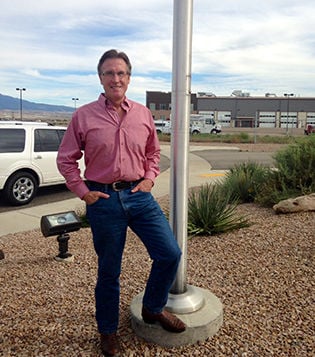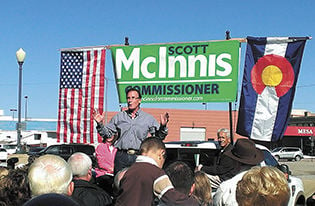McInnis battles feds, ruffles feathers as Mesa County commissioner

Rusting dump trucks. Feral cats. Potholed roads. A crumbling dog pound.
Scott McInnis has his hands full.
Being a Mesa County commissioner means dealing with a slew of problems. He is buttonholed by constituents over breakfast, stopped as he walks his dogs through his subdivision, and hailed from passing cars as he leaves the grocery store. He constantly hears from county residents in voice messages, texts and emails.
“Instead of getting calls about ISIS, people are calling me to say ‘There’s a crack in my road,’” said the former congressman and near candidate for governor, who professes to love his new job as an elected official in the Western Slope’s most populated county.

Mesa County Commissioner Scott McInnis stands in front of the Mesa County Animal Control building in Grand Junction during his weekly rounds checking in on county departments.Photo by Nancy Lofholm/The Colorado Statesman
“I am having so much fun,” McInnis said as he made his regular weekly rounds to county departments to look over aging road graders, check out the landfill operation and listen to animal-control woes.
But McInnis’s folksy enthusiasm for the elected position he has held for nine months paints a more bucolic picture than the current testy reality in this conservative farming and energy-heavy area.
He promised to shake up the status quo if elected, and he has been making good on that. Washboard roads and loose cats aside, McInnis has taken some polarizing positions on issues that are anything but business-as-usual in Mesa County.
He and his fellow commissioners this week asked the federal government to release all wilderness study areas in Mesa County. Last week, in a split vote, McInnis and another commissioner upended a long-standing contract relationship between the county and St. Mary’s Hospital. He not long ago pitted the commissioners against the good-ol’-boys structure of the local drainage district by questioning its governance and taxation. And he has been leading the charge to stop granting conservation easements in perpetuity on private lands.
All that has made the 61-year-old McInnis newly unpopular with some non-fans who grumble that he is more damaging in the county position than he was in Congress.
“While many of us hoped that Scott McInnis had shed his wicked congressional ways,” he’s at it again,” wrote Emily Pearson in a letter-to-the-editor to the local Grand Junction Daily Sentinel this week. “Surely at some point he’ll realize that being a county commissioner is different that sitting 2,000 miles away from those you govern.”
McInnis made that 2,000-mile leap in a reversal of the normal political trajectory. He did a loop-de-loop from statehouse to Congress to serious gubernatorial contender — to county commissioner.
As any Coloradan with a political memory recalls, he had an unusual fall from grace during his campaign for governor in 2010. He was the leading Republican hopeful when he was brought down by the “Musings on Water” scandal, or what McInnis now refers to ruefully as “the kick-in-the-gut” incident.
He had contracted with the Hasan Family Foundation for $300,000 to write a series of papers and give talks on water issues. McInnis, in turn, had hired a longtime water expert from his hometown of Glenwood Springs to do the actual research and writing.
The “Musings on Water” paper, published bearing McInnis’s name, turned out to have been copied verbatim and without attribution. McInnis was branded a plagiarist. That matter overshadowed everything else, even after he repaid the $300,000 and was later exonerated of dishonest conduct by the Colorado Supreme Court Attorney Regulation Counsel.
Unseasoned Tea Party candidate Dan Maes upset McInnis in the GOP primary. After former U.S. Rep. Tom Tancredo jumped in as a third-party candidate, Democrat John Hickenlooper won the governor’s race easily, and McInnis faded back into private life, though private life could be a bit of a misnomer in a county where 123,400 acres of conserved desert lands adjacent to the Colorado National Monument bear his name.

Former U.S. Rep. Scott McInnis announces his run for Mesa County commissioner at Pufferbelly Station Restaurant in Grand Junction in November 2013. Photo courtesy Scott McInnis
McInnis worked as director of the Associated Governments of Northwest Colorado for two years before he stormed into the county commissioner race last year. He called on old political cronies, including Philip Anschutz and other energy company executives, and out-raised his opponents by a wide margin.
In a county where 76 percent of the land is owned by the government and only 0.5 percent of the land has structures on it, McInnis has made bucking the federal government — and federal land management business-as-usual — a hallmark of his first year.
He has shaken up the sacrosanct work of the Mesa County Land Trust by refusing to carry on the rubber-stamping of proposed conservation easements. McInnis is arguing that easements should be set for 30 years rather than in perpetuity. The county’s lack of support means that funding for land conservation in the county is in jeopardy.
Jim Spehar, a former Grand Junction mayor and Mesa County commissioner, said McInnis has him scratching his head on that issue.
He said McInnis’s stance on the land trust matter “seems curious coming from a commissioner whose name in on a National Conservation Area which enjoys a variety of protective conditions which preserve it for future generations.”
This week, McInnis rattled more environmental-oriented constituents when he rallied his fellow Republican commissioners to pass a resolution opposing the Colorado Wilderness Act of 2015. The resolution went a step beyond opposition and asked Congress to release all wilderness study lands in Mesa County. It brought him back into conflict with his old congressional nemesis, U.S. Rep, Diana DeGette.
One of McInnis latest pot-stirrers was a vote to give a county medical insurance contract to Grand Junction’s small Community Hospital and an outside insurance company rather than to the locally based Rocky Mountain Health Plans and its preferred provider, the venerable St. Mary’s Hospital. Depending on who is commenting on that move, it was a gutsy break with the good ol’ boys system – or a questionable poke-in-the-eye for a hospital that has served the valley for more than a century.
Many McInnis watchers don’t even know about one of his more pugnacious actions since taking local office — a bit of Monkey Wrenching that fits right in with his newly honed anti-fed sensibilities.
He and some of his buddies on the county road crew decided to liberate a crumbling 83-year-old concrete marker that sat along old Highway 50 on the Colorado/Utah state line. It has been covered in graffiti and shot up, and they wanted to clean it up and place it alongside the “Welcome to Colorful Colorado” sign west of Grand Junction.
The BLM rejected the move, saying that it would take a five-year study before anything could be done. But just over a week after he took office, McInnis told a road supervisor to dig up the 13-ton marker and take it to a private concrete contractor for rehab. A BLM official cornered McInnis at a social function after that and told him he had violated federal law. But McInnis had done his homework and discovered the monolith had actually been sitting on a county road right-of-way. The BLM backed off.
To McInnis, that is the epitome of being a hands-on local official. Passing laws that affect a state or nation are one thing, but the quick-draw nature of local change is something else entirely.
“These are the kinds of things you can do,” he said. “And I’ve gotta say, it’s fun.”
CLARIFICATION: This story has been updated to reflect that the Mesa County medical insurance contract was awarded to Community Hospital and an outside insurance company instead of locally based Rocky Mountain Health Plans and its preferred provider, St. Mary’s Hospital. An earlier version of this story didn’t include information about the insurance companies.
















